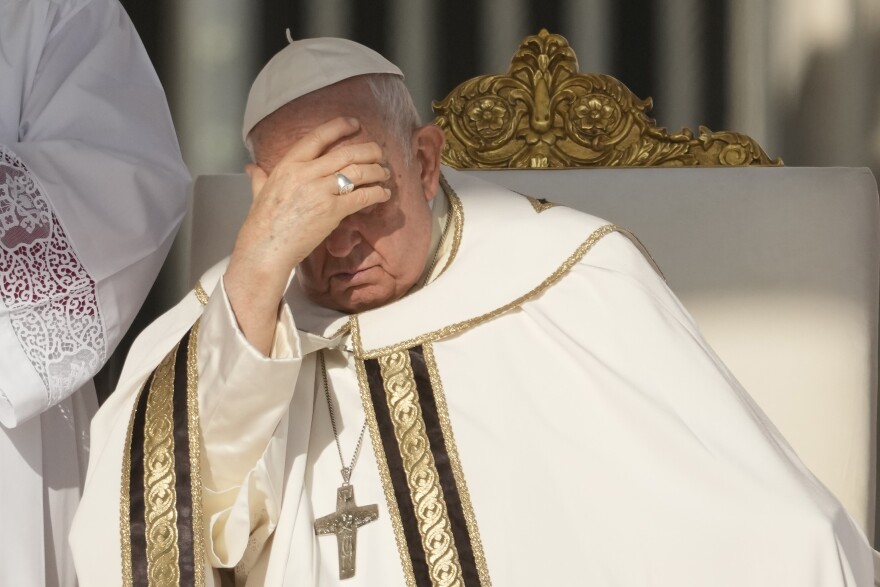COMMENTARY Pope Francis has suggested the church can bless same-sex unions — a reconsideration of Catholic teaching that reflects the ongoing rise of gay marriage in his native Latin America.
There’s some big doctrinal evolution going on in Rome this week when it comes to the LGBTQ community — and, ironically, we can thank Latin America for a big part of it.
I know, I know, as a Roman Catholic I’m never supposed to use “doctrine” and “evolution” in the same sentence. After all, when the church that claims to speak for my faith declares something is wrong, including homosexuality, the teaching can't be reconsidered. That would cast soul-damning doubt on the church's role as a divine instrument whose every action and utterance are guided by the Holy Spirit, and so on.
Never mind that the church didn’t seem to be on quite the same frequency as the Holy Spirit when its prelates were, say, burning heretics at the stake or shielding pedophile priests. If the Vatican says homosexual acts are “intrinsically evil" and "disordered,” that decides it for eternity. If it were to revise even that retro instruction, it would be jeopardizing the whole infallibility ruse the church has been leaning on for two millennia.
And yet, as he opened a synod, or gathering of bishops, at the Vatican this week, Pope Francis was unmistakably tweaking the church’s condemnation of LGBTQ romance: He signaled it’s time to let Catholic clergy bless single-sex unions.
READ MORE: After Orlando, is religious solidarity with gays also hypocrisy?
That would reverse a ban the Vatican issued on the blessing of gay marriage just two years ago.
“We cannot be judges who only deny, push back and exclude,” Francis wrote in a letter on the eve of the synod.
He of course didn’t say Catholic priests can marry gay couples. But for the Holy See to greenlight the holy sign of the cross being made over homosexual or lesbian nuptials — to give any sort of theological thumbs-up like that to something it heretofore demonized — represents a seismic dogmatic shift.
Consider that 13 years ago, when he was still Cardinal Jorge Bergoglio, the archbishop of Buenos Aires, Francis himself called Argentina’s approval of gay marriage “a scheme to destroy God’s plan” and “a real and dire anthropological throwback.”
And that’s a reminder that if we want to understand what’s driving Francis’ evolution on gay marriage, we should perhaps focus on precisely where he was at that time — Argentina and Latin America.
Francis has surely noticed more of his fellow Latin Americans are accepting LGBTQ people as simply a variation of, not a deviation from, the divine plan.
Francis has been Pope — the first Latin American pontiff — since 2013. Since then, the number of Latin American countries where gay marriage is legal has jumped from one to 10, including the continent’s four largest nations. No other developing region in the world has seen that level of societal LGBTQ acceptance.
I’m not saying that fact alone accounts for Francis’ approval of blessing same-sex unions. But I do think that as he’s looked back across the Atlantic this past decade, he’s had to have noticed two key things.
Disappearing Catholics
First, while his election as Pope was meant in no small part to halt Catholicism’s plummeting membership in Latin America, the hemorrhaging of Catholics there has continued. In 2010, in fact, two-thirds of Brazilians called themselves Catholic; today only half or less do.

Second, that drop has continued in no small part because Latin Americans have grown weary of their punitive Catholicism — including the denying, the pushing back, the exclusion of LGBTQ people, to quote Francis — and are rising from their kneelers to head in more enlightened directions.
I think he’s had to conclude that each time gay marriage-legalization has passed in Latin America, it’s led not to chest-thumping backlash but to shoulder-shrugging tolerance — a recognition that God created LGBTQ people as a variation of, not a deviation from, the divine plan.
I’m convinced Francis has studied all that in his native country and region, and realized that the church’s holy homophobia has to be reconsidered. Not only that issue but others — including female priests, which Francis also seems to suggest should be open for study in the synod that started this week.
That said, I’m well aware a lot of Latin Americans are abandoning Catholicism for evangelical sects that also malign the LGBTQ community. And that Francis has yet to explicitly renounce the medievalist Catholic teaching that the consummation of LGBTQ love is “intrinsically evil" and "disordered.”
But at least he — and Latin America — have gotten the doctrinal evolution rolling.






